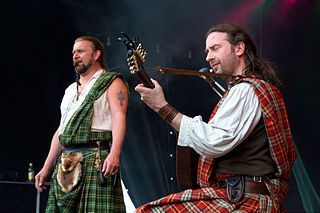
Celtic music is a broad grouping of music genres that evolved out of the folk music traditions of the Celtic people of Northwestern Europe. It refers to both orally-transmitted traditional music and recorded music and the styles vary considerably to include everything from traditional music to a wide range of hybrids.

Battlefield Band is a Scottish traditional music group. Founded in Glasgow in 1969, they have released over 30 albums and undergone many changes of lineup. As of 2010, none of the original founders remain in the band.
The Boys of the Lough is a Scottish-Irish Celtic music band active since the 1970s.

De Dannan is an Irish folk music group. It was formed in 1975 by Frankie Gavin (fiddle), Alec Finn, Johnny "Ringo" McDonagh (bodhrán) and Charlie Piggott (banjo) as a result of sessions in Hughes's Pub in Spiddal, County Galway, Ireland, with Dolores Keane (vocals) subsequently being invited to join the band. The fiddler Mickey Finn (1951–1987) is also acknowledged to have been a founding member.

Andrew Kennedy Irvine, known professionally as Andy Irvine, is an Irish folk musician, singer-songwriter, and a founding member of Sweeney's Men, Planxty, Patrick Street, Mozaik, LAPD and Usher's Island. He also featured in duos, with Dónal Lunny, Paul Brady, Mick Hanly, Dick Gaughan, Rens van der Zalm, and Luke Plumb. Irvine plays the mandolin, mandola, bouzouki, harmonica, and hurdy-gurdy.

Celtic music is primarily associated with the folk traditions of Ireland, Scotland, Brittany and Wales, as well as the popular styles derived from folk culture. In addition, a number of other areas of the world are known for the use of Celtic musical styles and techniques, including Newfoundland, and much of the folk music of Canada's Maritimes, especially on Cape Breton Island and Prince Edward Island.
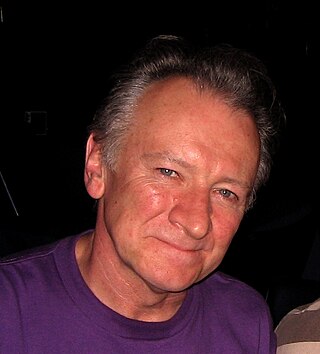
Dónal Lunny is an Irish folk musician and producer. He plays guitar and bouzouki, as well as keyboards and bodhrán. As a founding member of popular bands Planxty, The Bothy Band, Moving Hearts, Coolfin, Mozaik, LAPD, and Usher's Island, he has been at the forefront of the renaissance of Irish traditional music for over five decades.

Prosperous is the second album by Irish folk musician Christy Moore, released in 1972. His first album, Paddy on the Road, was recorded by Dominic Behan in 1969 and has long been out of print. In addition to Moore's guitar and voice, Prosperous featured musicians Andy Irvine, Liam Óg O'Flynn and Dónal Lunny. These four musicians later gave themselves the name Planxty, making this album something of the first Planxty album in all but name. Other musicians included Kevin Conneff on bodhrán, Clive Collins on fiddle, and Dave Bland on concertina.

A folk instrument is a traditional musical instrument that has remained largely restricted to traditional folk music, and is not usually used in the classical music or other elite and formal musical genres of the culture concerned, though related instruments may be.
Danú is an Irish traditional music band.
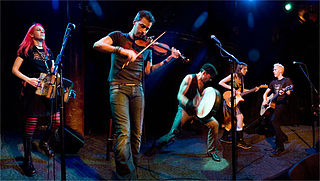
Culann's Hounds are a traditional Irish folk band from San Francisco, California, United States. Founded in 1999 by Steve Gardner and Michael Kelleher as The Irish Bastards, the band began playing gigs and soon adopted the more broadly appealing name.
Na Casaidigh or The Cassidys are an Irish traditional group. They have been based in Dublin for many years, but they originally hail from Gweedore, County Donegal. The group consists of brothers Aongus, Seathrún, Ciarán, Fionntán, Feargus, and Odhrán. Irish is their native tongue and they had to study English as a second language during their school years. The brothers' music has attracted worldwide attention and brought them to audiences from Togo in West Africa to Carnegie Hall in New York City.
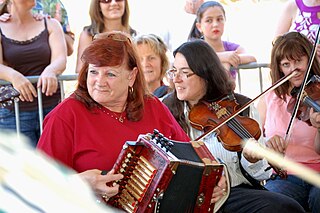
A music session is a social gathering of musicians and singers who perform music in a relatively informal context. Much of the music performed at such events is traditional music for the area, popular songs and other well-known tunes. In sessions, the participants typically improvise the accompaniment, song arrangements and musical ornaments to the melodies of songs or tunes. The venue may be a public bar, tavern, village hall or a private home.

Lori Watson is a fiddle player and folk singer who performs traditional and contemporary folk music. She is the first doctor of Artistic Research in Scottish Music.

Irish traditional music is a genre of folk music that developed in Ireland.
Scoil Gheimhridh Frankie Kennedy was a traditional music winter school held annually in Gweedore, County Donegal, Ireland starting December 1994 in memory of Belfast flautist Frankie Kennedy who died on 19 September 1994. The last session ended in January 2014. It has been succeeded by the "Scoil Gheimhridh Ghaoth Dobhair".

Capercaillie are a Scottish folk band, founded in 1984 by Donald Shaw and led by Karen Matheson, and which performs traditional Gaelic and contemporary songs in English. The group adapts traditional Gaelic music and traditional lyrics with modern production techniques and instruments such as electric guitar and bass guitar, though rarely synthesizers or drum machines.

Kennedy's Kitchen is an American band consisting of seven musicians who compose Traditional Irish music. Since forming in 1998, it has been based in South Bend, Indiana, United States. Led by joHn Kennedy, Kennedy's Kitchen has performed at various venues across the Midwest portion of the United States and beyond.
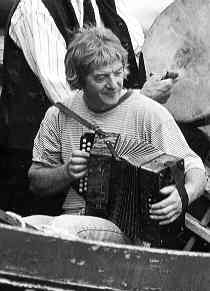
Charlie Piggott is an Irish traditional musician, best known as a founding member of De Dannan and has toured extensively in Europe, Canada, and the US.
Celtic music in Poland has become more and more popular in culture, inspiring more artists to perform this type of music. Since 2003, in the last week of the summer holiday Celtic Music Festival ZAMEK takes place in Będzin. It is one of the biggest Celtic festivals in Central Europe.
















